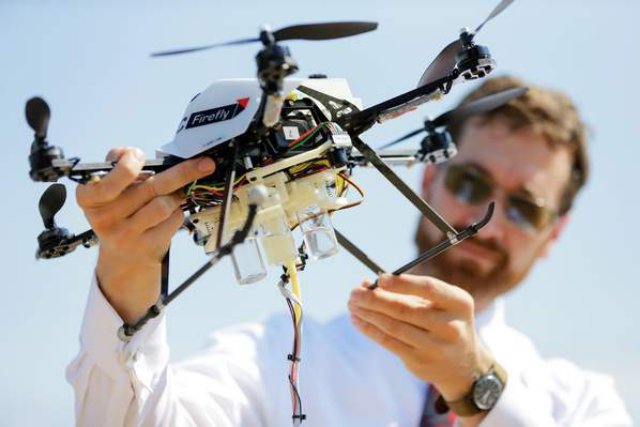 When natural disaster next strikes, a UAS built by University of Nebraska-Lincoln researchers may fly in to check on the water supply where people cannot.A project underway at the Nebraska Intelligent Mobile Unmanned Systems Lab aims to build unmanned aircraft systems that can fly over difficult-to-reach bodies of water and collect samples for analysis. The team won a grant from the U.S. Department of Agriculture to develop the UAS and ensure safety and reliability for possible use in the field.
When natural disaster next strikes, a UAS built by University of Nebraska-Lincoln researchers may fly in to check on the water supply where people cannot.A project underway at the Nebraska Intelligent Mobile Unmanned Systems Lab aims to build unmanned aircraft systems that can fly over difficult-to-reach bodies of water and collect samples for analysis. The team won a grant from the U.S. Department of Agriculture to develop the UAS and ensure safety and reliability for possible use in the field.
The award, for more than $950,000, will enable the project — with partners at the University of California, Berkeley and UNL’s Drone Journalism Lab — to continue for three years.
“There is potential for huge benefits to society by using these unmanned aircraft systems for dangerous or expensive tasks,” said Carrick Detweiler, professor of computer science and engineering and leader of the project.
A big piece of their work will be teaching the aircraft, about the size of a remote-control helicopter, to operate without human assistance. Their prototypes are still being tested in the lab, where they fly up and over a fish tank, hover and drop a pump that fills one of 10 collection cups. Their goal is to create a UAS that can do analysis in the field and drop samples that aren’t useful in favour of new samples.
The prototypes are battery-operated and fly for up to 20 minutes. For now, people are still involved in giving commands for safety purposes, said John-Paul Ore, a graduate student on the project. But the future is automation.
“The challenge is for the robot to sense and move,” Ore said. “Right now we need to tell it everything.”
The team hopes to be testing in the field next year. By then, the Federal Aviation Administration may have written rules to govern the small aircraft, but the team has applied in the meantime for a waiver to allow UAS flight outside the lab.
They know the idea of unmanned crafts gives some people pause, but the researchers hope the benefits of the project will be obvious. UAS use of this type is not the sort that groups with privacy concerns about unmanned aircraft use would get involved with, said Amie Stepanovich, Director of the Electronic Privacy Information Center’s Domestic Surveillance Project in Washington, D.C. She believes the vast majority of commercial drones won’t affect privacy at all.
“They’re going to be used for agriculture and water testing and for monitoring in the aftermath of natural disasters, which are all very positive things we’d like to be able to do cheaper or more easily,” Stepanovich said. “When they’re used to collect personally identifiable information about an individual is where we get concerned.”
When it comes to science, Ore said he believes the water collection project is just at the beginning of the benefits to be reaped from the small crafts.
“Whether you’re a farmer, firefighter or insurance adjuster, in the future you will not think about doing your job without one,” he said.
Photo: NU research assistant John-Paul Ore with a water-collecting UAS – Associated Press
Source: Omaha.com
